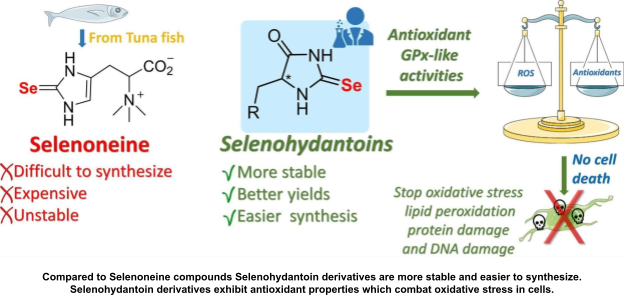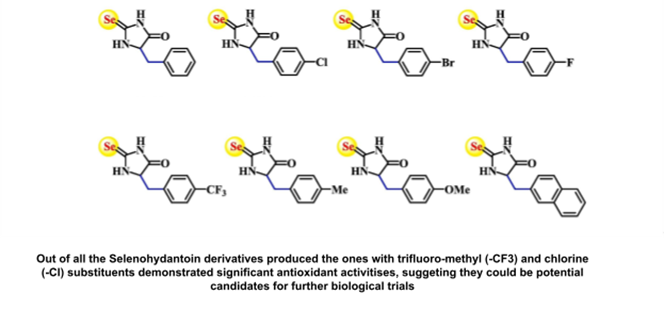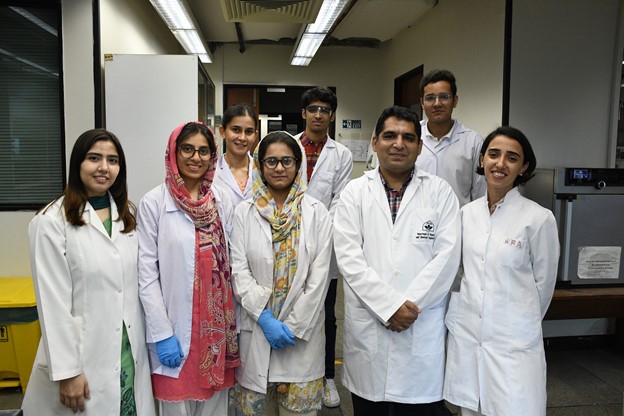Unleashing the Power of Selenium
SSE Post: https://sbasse.lums.edu.pk/unleashing-the-power-of-selenium
TW: https://twitter.com/sbasselums/status/1733043887722410239

Selenium is a vital trace element that plays a crucial role in our health, influencing various biochemical pathways due to its antioxidant properties. In nature, it often finds its way to our plates through foods like tuna, enriching our bodies with its antioxidant prowess.
The intricate relationship between Selenium and antioxidant properties has been extensively studied by researchers in the field, including Dr. Rahman Shah Zaib Saleem from the Department of Chemistry and Chemical Engineering at SBASSE, who is one of the contributors to a paper on Selenium derivatives. The paper was published after Dr. Rahman’s DAAD (Deutscher Akademischer Austauschdienst) scholarship visit to Germany in 2019 in collaboration with eleven international researchers, including Dr Rama Alhasan, Dr. Guilherme M. Martins, Dr. Pedro P. de Castro, Dr. Claus Jacob.

Selenium, acting as an antioxidant powerhouse, takes center stage in this study. Nature carries very few selenium containing organic compounds, Selenoneine being one of those. In this work, the team has worked on the preparation of novel organoselenium compounds. The research zeroes in on Selenohydantoin derivatives, synthetic compounds inspired by Selenoneine. These derivatives, with their fascinating range of pharmacological applications, hold the potential to serve not just as antioxidants but as versatile agents with capabilities spanning anti-inflammatory, anticancer, and antiplatelet realms. Through Selenocysteine enzymes like Glutathione Peroxidase, it acts as a powerful defender, effectively reducing peroxides to explore their potential in combating oxidative stress, a state where an imbalance occurs between the production of free radicals and the body’s ability to neutralize them.
Using a unique synthetic method, the researchers synthesized Selenohydantoin molecules, paving the way for a comprehensive evaluation of their antioxidant capabilities. The study employed classical radical scavenging and metal-reducing techniques to unravel the true potential of these synthetic compounds. Cytocompatibility assays demonstrated that the Selenohydantoin derivatives were not only effective antioxidants but also non-toxic to primary human aortic smooth muscle cells. Cytocompatibility refers to the compatibility of a substance with living cells, ensuring that these compounds do not harm or disrupt normal cell function, a promising aspect for further biological evaluations.
Among the synthesized compounds, those adorned with trifluoro-methyl (-CF3) and chlorine (-Cl) substituents emerged as molecules displaying noteworthy antioxidant activities. Dr. Rahman’s work highlights these compounds as potential candidates for future biological studies, offering hope for innovative therapies against chronic diseases. This research focuses not only on synthetic compounds but also on the broader context of organoselenium compounds in living organisms. Looking into the future a larger picture emerges – synthesis of Selenium-based compounds could play a crucial role in developing novel and effective prevention and treatments for diseases such as cancer, cardiovascular diseases, cystic fibrosis and rheumatoid arthritis.

Dr. Rahman has recently been honored with another DAAD (Deutscher Akademischer Austauschdienst) scholarship grant by the German Academic Exchange Service. Through the scholarship Dr. Rahman and his research team will delve into the study of various signaling proteins and kinases, with a particular focus on the innovative molecule known as Proteolysis Targeting Chimeras (PROTACs). To learn more about Dr. Saleem’s cutting-edge research and the potential impact of PROTACs on cancer treatment, follow this link.
DAAD Fellowship 2023
Social media posts:
Facebook: https://www.facebook.com/photo/?fbid=765603092248913&set=a.496574855818406
Twitter: https://x.com/sbasselums/status/1714128974681702701?s=20
LinkedIn: https://www.linkedin.com/feed/update/urn:li:activity:7119895197810929665
Instagram: https://www.instagram.com/p/CyfF56DI8Q9/
Original SBASSE article: https://sbasse.lums.edu.pk/daad-recipient-rahman-shah-zaib

Advancing Cancer Research – Dr. Rahman Shah Zaib Saleem Receives DAAD Scholarship
Authors: Sara Amir – Carl Sagan Intern
Dr. Rahman Shah Zaib Saleem, associate professor in the Department of Chemistry and Chemical Engineering at SBASSE, has been awarded an internationally competitive DAAD (Deutscher Akademischer Austauschdienst) scholarship grant by the German Academic Exchange Service. This grant will provide Dr Saleem and his research team with the resources and funding necessary to study different kinds of signaling proteins and kinases. His focus during this visit will be on novel molecule called Proteolysis Targeting Chimeras (PROTACs). These molecules are new tools for the targeted protein degradation that can, in turn, potentially slow down cancer growth.
Kinase inhibitors are small molecules which inhibit the activity of cancer growth and other related diseases by disrupting the signaling pathways of the kinases. Protein kinases are enzymes that affect the biological activity of proteins and cellular signaling pathways. They are responsible for adding phosphate groups to specific amino acids. As a result, this addition of phosphates can cause the activation or deactivation of proteins, modulate their functioning and relay signals within the cell. The dysregulation of the kinase activity is often linked with diseases, including cancer, thus making kinases good drug targets.
PROTACs (Proteolysis Targeting Chimeras) are novel protein degraders discovered and currently employed in drug development for cancer. They can be designed to target the problematic proteins, including kinases, and tag them for degradation. While inhibitors block kinase activity, PROTACs eliminate the protein, which is more effective in halting cancer progression. They are also designed to be highly selective, reducing potential side effects by sparing healthy cells. The development of these compounds has a far-reaching impact on drug discovery as proteins previously described as undruggable can now be considered degradable, which, as a result, offers vast positive consequences for the treatment of various diseases.
The DAAD (Deutscher Akademischer Austauschdienst) scholarship grant has a long history of supporting cutting-edge research, allowing academics in different parts of the world to develop close ties with notable researchers in Germany. The scholarship will allow Dr. Saleem to collaborate with Dr. Stefan Knapp, and conduct research in his lab at Goethe University in Frankfurt, Germany.

“This is the beginning of a long-term collaboration”, shares Dr Saleem. He aims to identify potential new drugs, not only for for the the kinases with proven therapeutic importance, but also develop probes for the kinases that have not been targeted yet and aims to unearth their therapeutic potential.







